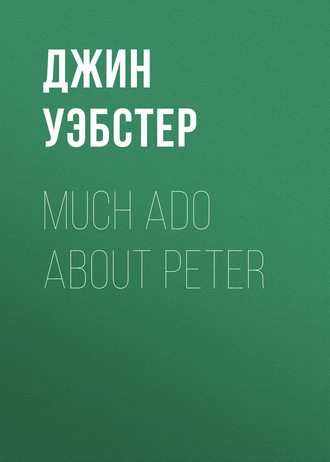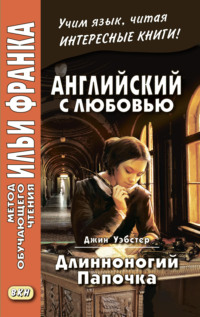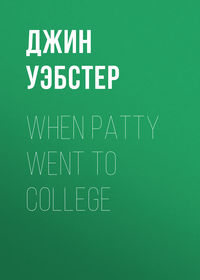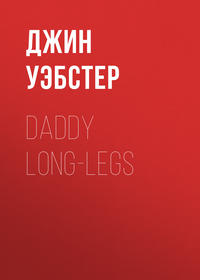
Much Ado About Peter
"I'm fetching him out something to eat," she explained. "They don't give him nourishment enough for a kitten. A man of Joe's size can't keep up his strength on beef tea and soft-boiled eggs."
As they drove through the gate, a small figure sprang out from the bushes in front of the astonished Trixy's head.
"I'm sorry to detain you," said Bobby, with dignified aloofness—his expression suggested that he had never seen Peter before—"but my orders are to search every person leaving the premises."
"Lord love you, Master Bobby! What are you playing at now?" inquired Joe's wife with wide-eyed amazement.
"I am Robert Carter, of the Secret Service," said Bobby, icily, as he walked to the rear of the buckboard and commenced his search. "Ha! What is this?" He raised the towel that covered the basket and suspiciously peered inside. It contained two pies, a quantity of doughnuts, and a jar of cherry preserves. "Madam, may I ask where you obtained these articles?" His manner was so stern that she stammered her reply with an air of convicted guilt.
"I—I made them myself. They're for Joe in the hospital."
"H'm!" said Bobby. "As they are for charitable purposes, I will not confiscate the entire lot." He gravely abstracted two of the most sugary doughnuts and transferred them to his pocket. "These will be sufficient to exhibit at headquarters with a description of the rest. Please favour me with your names and addresses."
Peter complied in all seriousness. Evidently, his was a case of dual personality; he represented the local police only when he was not acting as coachman. He drove on with an amused grin. After all, the boys and their escapades added to the dull routine of daily life a spice of adventure which most twentieth century households lacked; the entertainment they furnished paid for the trouble they caused.
Three hours later Peter set down Joe's wife at the door of the cottage and drove on to the stables. As he rounded the corner, he perceived an excited group gathered under the apple tree where he had left Annie and her kindergarten class.
"There he is!" cried Nora. "Peter! Come here quick."
Peter threw the lines to an adjacent groom—the one who had been told not to leave the stables—and hurriedly joined the circle. He found Annie collapsed on her bench beside the baby-carriage, rocking back and forth, and sobbing convulsively, while the other servants crowded about her.
"What's the matter?" he gasped.
"They've stolen the baby!" Annie wailed.
Peter felt a cold chill run up his back as he peered into the empty carriage. For a moment he was silent, struggling to grasp the full horror of the fact; then he laid a hand, none too lightly, on Annie's shoulder, and shook her into a state of coherence.
"Stop yer noise an' tell me when it happened."
"Just now! Just a few minutes ago. The baby was asleep, an' Vittorio, he had some new flowers in the farther bed, an' he wanted me to tell him their name. I wasn't gone more'n five minutes, an' when I come back I peeked in to see if the baby was all right, an' the carriage was empty! We've hunted everywhere. He's gone—stolen just like the lap-robes."
Annie buried her head in her arms and commenced sobbing anew. Peter's face reflected the blankness of the others.
"Lord! This is awful! What will its mother be sayin'?"
Annie's sobs increased at this agonizing thought.
"It's them Armenian-lace women," Nora put in. "Master Bobby says they're gypsies, and are always stealing babies and holding them for ransom."
"Haven't ye done anything?" he cried. "Didn't ye telephone for the p'lice?"
"Master Bobby wouldn't let us. He says the local police are blind as bats and what we need are detectives. An' above all, he says, we must not let it get into the papers; his father is awful mad when anything gets into the papers. Leave it to him, he says, and he'll have the gypsies shadowed."
"This ain't no time for play," growled Peter, whirling toward the house and the telephone. "What's that?" He stopped as his eye lighted upon a vivid sheet of paper lying on the ground.
"It was pinned to the p-pillow," Annie sobbed.
Peter snatched it up and stared for a moment in blank amazement. The words were printed in staggering characters, a bright vermilion in tone.
A flash of illumination swept over Peter's face.
There was an old barn at the end of the lane that had been moved back when the new stables were built. A few days before, Peter, himself unobserved, had seen Wallace knock three times on the door, and had heard a voice from inside respond:
"Who goes there?"
"A friend," said Wallace.
"Give the countersign."
"Blood!"
"Pass in," said the voice.
The door had opened six inches while Wallace squeezed through. Peter had supposed it merely their latest play, unintelligible but harmless; now, however, he commenced putting two and two together. Evidently, his was not the only case of dual personality.
"Gee! I'm a fool not to have thought of it," he muttered.
"Oh, Pete!" Annie implored. "Do you know where he is?"
Peter controlled his features and gravely shook his head.
"I can't say as I do, exactly, but this here paper furnishes a clue. I think p'raps I can find the baby without calling in the p'lice." He faced the others. "Go back to the house and watch out that none o' them gypsy women comes prowlin' around." He waited until they were out of hearing, then he sat down on the bench by Annie. "I'll find the kid on just one condition—ye're to let that Dago alone. D'ye understand?"
"Get the baby, hurry—please! I'll talk to you afterward."
"I think I'll be talkin' just a second now. Ye know well enough I never had nothin' to do with that Circassian Beauty girl."
"Yes, yes, Pete! I believe you. I know you didn't. Please go."
"Stop thinkin' o' the kid a minute an' listen to me." He reached over and grasped her firmly by the wrist. "If I fetches him back without no hurt before his mother gets home, will everything be just the same between us as before I took ye to that infernal Heart of Asia?"
"Yes, Pete, honest—I promise." Her lips trembled momentarily into a smile. "I knew you didn't have nothing to do with her. I just wanted to make you mad."
His grasp tightened.
"Ye succeeded all right."
"Ow, Pete, let me go! You hurt."
He dropped her wrist and rose to his feet.
"Mind, now, this is on the straight. I finds the kid an' we're friends again."
She nodded and smiled into his eyes. Peter smiled back, and swung off, whistling, down the lane. A rustling behind the hedge, and a scampering of feet, warned him that the enemy had posted scouts. He stilled his whistle and approached the old barn warily. It presented a blank face when he arrived; the door was shut and locked. He pounded three times. A startled movement occurred inside, but no challenge. He pounded again, more insistently, pushing with his shoulder until there was the sound of straining timber.
"Who goes there? Give the countersign," issued from the keyhole in Master Augustus's tones.
"Blood!" said Peter, with grim emphasis.
A pause followed, during which he kept his ear to the crack. A whispered consultation was going on inside, then presently, a small window opened and Master Augustus's head appeared.
"Oh, Pete! Is dat you?" There was relief in his tone. "Wait a minute an' I'll let you in. I was 'fraid it was gypsies."
"Well, it ain't gypsies; it's the local p'lice on the track o' stolen goods. You open up that door an' be quick about it!"
A long wait ensued while Augustus ineffectually fumbled with the lock, talking meanwhile to Peter in as loud a voice as possible to drown the sound of movement behind him. The door was finally flung wide, and Peter was received with a disarming smile. He stepped inside and peered about.
"Where have ye hid the other boys?" he demanded.
"I'm a p'liceman," lisped Augustus, with engaging inconsequence, "stationed here to guard de lane. I fought it was safest to keep de door locked for fear some more gypsy people might come along."
"Where's the ladder gone to that loft?"
"De ladder?" Augustus raised wide innocent eyes to the hole in the ceiling. "Maybe de same person stole de ladder as stole de ovver fings."
"Maybe," Peter assented genially, as he squinted up through the opening.
The end of the ladder was visible, also the end of a rope-ladder, easier to haul up in emergencies. The clothes-line at least was accounted for. Peter took off his coat, shoved a saw-horse under the opening, and sprang and caught the edge of the scuttle, while Augustus, in a frenzy of remonstrance, danced below and shouted warnings. After a few convulsive kicks Peter swung himself up and sat down on the edge of the scuttle to get his breath, while he took a preliminary survey of the room. There was no doubt but that he had tracked the robbers to their den. Opposite him, in letters a foot high, the legend sprawled the length of the wall:
As his eyes roved about the room they lit on one familiar object after another. The four walls were hung with sheets; two pirate flags of black broadcloth (he recognized his lap-robes) fluttered overhead; the centre of the room was occupied by the umbrella-stand, upside down, serving as a pedestal for the Bible, and the tomato stakes, made into cross swords, decorated the walls. The booty was there, but the thieves had escaped. A second, more thorough examination, however, betrayed in a shadowy corner, a slight bulging of the sheets, while sundry legs protruded from below. Peter stalked over, and laying a firm grasp on the nearest ankle, plucked out Master Wallace from behind the arras. He set the boy on his feet and shook him.
"What have ye done with that baby?"
Wallace dug his fists into his eyes and commenced to whimper. Peter tried another cast, and fetched out Master Bobby.
"Hello, Pete!" said Bobby, with cheerful impudence.
"You cough up that baby," said Peter.
"He's in the wash-boiler." Bobby waved his hand airily toward the opposite end of the room.
Peter, still grasping Bobby's collar with a touch unpleasantly firm, strode across and raised the lid. The baby was sleeping as peacefully as in his own perambulator.
"We were just going to return him when you came." Bobby's voice contained an increasing note of anxiety. "We fed him and sterilized his milk just like Annie does. He's been having a bully time, laughing and crowing to beat the band. He likes adventures. It's terribly stupid lying all day in that carriage; a little change is good for his health."
Peter shook his captive. "What's the meanin' o' this?" His gesture included the entire interior.
"We're robbers," said Bobby, stanchly. "I'm Huck Finn, the Red-handed, and Jerome's Tom Sawyer, the Terror of the Plains. When we saw that baby left alone in the carriage, we thought we ought to teach Annie a lesson. We meant to turn into detectives pretty soon and raid this robber den and take the baby back. We were just getting ready to be detectives when you came."
"This is one time the local police got in first," observed Peter. "What's that Bible for?"
"To take our oaths on."
"Huh! I guess yer mother will be havin' somethin' to say to that." He lowered the ladder and faced the robbers. There were three by this time: Jerome had emerged of his own accord. "I'll take the baby meself. Master Bobby, ye follow with the Bible; Master Jerome, ye rip the skull an' bones off them lap-robes, fold 'em up neat, an' put 'em in the closet where they b'long. I'll give ye just half an hour to break up this gang an' return the loot. Master Augustus!" Peter bellowed down the trap, "fetch four pairs o' handcuffs an' have these robbers at the p'lice station in half an hour to hear their sentence."
He shouldered the baby with awkward care, and retraced his steps toward the house. Annie was still drooping on her bench. Peter approached softly from behind.
"Here he is like I promised."
"Oh, Pete! Is he hurt?" She snatched the child from his arms and commenced anxiously examining his limbs for injuries. The baby grabbed her hair and cooed. She covered him with kisses. "Where'd you find him?"
"I found him—where I found him," said Peter, cannily, "an' don't ye be leavin' him alone again."
"I won't! I can't never thank you enough."
"Yes, ye can—by not flirtin' with that Dago any more."
"I wasn't flirtin' with him; he don't care nothin' about me. All he wants is to learn to talk."
Peter looked sceptical.
"Honest, Pete! It's the livin' truth. I never flirted with no one, except—maybe you."
Peter's face softened momentarily, but it hardened again as a shadow fell between them. Vittorio was standing on the other side of the hedge.
"You find-a dat baby?" he inquired with an all-inclusive smile. As the fact was self-evident, nobody answered. Vittorio was a romantic soul; he caught the breath of sentiment in the air. "Annie you girl?" he inquired genially of Peter.
Peter scowled without speaking.
"I got-a girl too, name Marietta. Live-a Napoli. Some day I send-a money, she come Americ'; marry wif me. Nice girl, Marietta. Annie nice girl, too," he added, as a polite afterthought. "You marry wif her?"
Peter's face cleared.
"Some day, Vittorio, if she'll be havin' me." He stole a side glance at Annie. She rose with a quick flush.
"Quit your foolin', Pete! 'Tis time this baby was getting his supper. Would you mind settin' his carriage on the porch? Good night, Vittorio." She tucked the baby under her arm and started, singing, for the house.
Peter put up the carriage and sauntered toward the stables in the utmost good humour. He found Augustus with his prisoners drawn up in line, their wrists and ankles shackled together.
Augustus saluted. "I caught free robbers," he observed. "De ovver one 'scaped."
Peter drew his face into an expression of judicial sternness. "What have ye got to say for yourselves?" he growled.
There was silence for a moment, then Jerome ventured: "We're going away in three days. I shouldn't think at the very end you'd want to have hard feelings between us."
"If you tell mother," Bobby added, "you'll get Annie into an awful lot of trouble. Annie's been good to me. I'd hate to have her get a scolding."
Peter suppressed a grin.
"Ten years at solitary confinement is what ye deserve," he announced, "but since there's extenuatin' circumstances, I'll let ye go free on parole—providin' ye play base-ball all the rest o' the time."
"I say, Pete, you're bully!"
"It's a bargain," said Peter. "An' mind ye keep to it. Officer, set free the prisoners."
VII
GEORGE WASHINGTON'S UNDERSTUDY
"Wait a moment, Peter," Miss Ethel called from the veranda, as he was starting for the village with the daily marketing list. "I want you to drive around by Red Towers on your way home and leave this note for Mrs. Booth-Higby."
"Very well, Miss Ethel." Peter reined in Trixy and received the note with a polite pull at his hat brim.
"And, Peter, you might use a little discretion. That is—I don't want her to know–"
"You trust me, Miss Ethel; I'll fix it."
Her eyes met his for a second and she laughed. Peter's face also relaxed its official gravity as he pocketed the note and started off. He understood well the inner feelings with which she had penned its polite phrases. A battle had been waging in the Carter family on the subject of Mrs. Booth-Higby, and the presence of the invitation in Peter's pocket proved that Miss Ethel was vanquished.
The invitation concerned a garden party to be given at Willowbrook on the evening of the fifteenth, with the Daughters of the Revolution as guests of honour, and amateur theatricals as entertainment. Peter knew all about it, having arduously assisted the village carpenter in the construction of rocks, boats, wigwams, log-cabins and primæval forests. He knew, also, that the chief attraction of the evening would not be the theatricals, but rather the presence of a young Irish earl who was visiting Mr. Harry Jasper. Miss Ethel was also entertaining guests, and the two households formed an exclusive party among themselves. The entire neighbourhood was agog at the idea of a live lord in their midst, but so far no one had seen him, except from a distance, as he was whirled past in Mr. Harry's motor, or trailed across the golf links in Miss Ethel's wake. She was planning to exhibit him publicly on the night of the garden party.
The question of invitations had been difficult, particularly in the case of Mrs. Booth-Higby. In regard to this lady society was divided into two camps, comprising those who received her and those who did not. Miss Ethel was firm in her adherence to those who did not, but her father and mother had tacitly slipped over to the other camp—Mr. Carter being a corporation lawyer, and Mr. Booth-Higby a rising financier. Peter likewise knew all about this, Mrs. Carter and her daughter having discussed the matter through the length of a seven-mile drive, while he sedulously kept his eyes on the horses' ears, that the smile which would not be suppressed might at least be unobserved.
Mrs. Carter had maintained that, since Mrs. Booth-Higby was a member of the Society, not to invite her would be too open a slight. Miss Ethel had replied that the party was purely a social affair—she could invite whom she pleased—and she had added some pointed details. The woman's maiden name, as everyone knew, was Maggie McGarrah, and her father, previous to his political career, had kept a saloon; she was odious, pushing, nouveau riche; she dyed her hair and pencilled her eyebrows, she didn't have a thought in the world beyond clothes, and she flirted outrageously with every man who came near. Peter's smile had broadened at this last item. It was, he shrewdly suspected, the keynote of the trouble. Miss Ethel had caught Mr. Harry Jasper paying too assiduous attention to Mrs. Booth-Higby's commands on the occasion of a recent polo game.
Peter felt that when Mrs. Carter and her daughter matched wills, the result was pretty even betting, and his sporting instincts were aroused. He had been interested, upon delivering the invitations, to see that there was none for the Booth-Higbys; and now his interest was doubly keen at receiving it three days late. Miss Ethel had succumbed to the weight of superior argument.
He turned in between the ornate gates of Red Towers—the two posts surmounted by lions upholding a mythical coat of arms—and drew up in the shadow of an imposing porte-cochère. A gay group of ladies and gentlemen were gathered in lounging chairs on the veranda, engaged with frosted glasses of mint julep; while Mrs. Booth-Higby herself, coifed and gowned as for an evening reception, was standing in the glass doors of the drawing-room. As her gaze fell upon Peter she strolled toward him with a voluminous rustle of draperies.
"Whose man are you?" she inquired, with an air of languid condescension.
Peter's face reddened slightly. The entire group had ceased their conversation to stare.
"Mr. Jerome Carter's," he replied, fumbling for the note.
"Ah!" said Mrs. Booth-Higby, with a lifting of the eyebrows.
"It should have come three days ago," Peter glibly lied. "Miss Carter give me a lot o' them to deliver; this one must have slipped down the crack between the cushions an' got overlooked. We come across it this mornin' when we was washin' the buckboard, so I drove over with it on me way home from the marketin'. I hope that it ain't important, and that ye won't feel called upon to tell Miss Carter? It would get me into trouble, ma'am."
Her face had cleared slightly during this recital; it was evident that she knew about the garden party, and had entertained emotions over the absence of her own invitation. She saw fit now to work off her stored-up anger upon the delinquent. Peter knew his place, and respectfully swallowed the scolding, but he did it with a cordial assent to Miss Ethel's description of the lady's character. She ended by bidding him wait for an answer. He heard her say, as she swept down the veranda:
"Excuse me a moment while I answer this note. It's from Ethel Carter, Jerome Carter's daughter, you know"—evidently this was a name to conjure with—"an invitation to meet Lord Kiscadden. It should have come three days ago, but their man stupidly forgot to deliver it. He is begging me not to report him, though I feel that such carelessness really ought to be punished." She rustled on into the house, and Peter sat for twenty minutes flicking the flies from Trixy's legs.
"An' she's a daughter o' Tim McGarrah!" he repeated to himself. There had been nothing snobbish about Tim; he was hail-fellow-well-met with every voter east of Broadway. "She's ashamed of him now," Peter reflected, "and won't let on she ever heard the name; but the old man was ten times more a gentleman than his daughter is a lady, for all his saloon!"
His cogitations came to an end as Mrs. Booth-Higby rustled back, a delicately tinted envelope in her hand and a more indulgent smile upon her lips.
"There are to be theatricals?" she inquired, in a note of forgiveness.
"I believe so, ma'am."
"Is Lord Kiscadden to take part?"
"Can't say, ma'am."
Peter, as scene-shifter, had had ample opportunity to study Lord Kiscadden's interpretation of the character of George Washington—his lordship, with a fine sense of humour, had himself selected the rôle—but at mention of the name, Peter's face was blank.
"Is he to remain much longer at Jasper Place?" she persisted.
"Haven't heard him say, ma'am."
She abandoned her pursuit of news, handed him the note, and graciously added ten cents.
Peter touched his hat gravely, murmured, "Thank ye, ma'am," and drove away. At the foot of the lawn the Booth-Higby peacock—supposedly a decoration for the Italian garden, but given to wandering out of bounds—trailed its plumage across his path. Peter shied his ten cents at the bird's head, with the muttered wish that the coin had been large enough really to accomplish damage.
The day of the garden party showed a clear sky above, and Peter was up with the dawn and at work. Miss Ethel had appointed him her right-hand man, and though he had the entire stable and house force to help him, he found the responsibility wearing. He was feeling what it was to be a Captain of Industry. He superintended the raising of a supper tent on the lawn, strung coloured electric bulbs among the branches of the trees, saw the furniture moved out of the drawing-room and a hundred camp chairs moved in. He spent the afternoon shifting scenery for the dress rehearsal; but finally, close upon six, he shoved Plymouth Rock back into place for the first tableau, and, with a sigh of relief, turned toward the kitchen. He felt that he had earned a fifteen-minutes' chat with Annie.
But fresh trouble awaited him. He found Mrs. Carter and Nora in anxious consultation. The ice-cream had not come; and the expressman, who had already met three trains, said that he could not deliver it now until morning.
Mrs. Carter pounced upon Peter.
"Is Miss Ethel through with you? Then drive to the station immediately and meet the six-twenty train. If it isn't on that, stop at Gunther's and tell them they will have to make me seven gallons of ice-cream before ten o'clock to-night. It's disgraceful! I shall never engage Perry to cater again. And tell the expressman that I consider him very disobliging," she threw after him.
An hour and a half later he dumped three kegs of ice and brine on the back veranda, and was turning away, cheered by the near hope of his long-postponed supper when Annie hailed him from the kitchen window.
"Hey, Pete! Wait a minute. Miss Ethel said, as soon as you got back, for me to send you to the library."
"What are they wantin' now?" he growled. "I'll be glad when that bloomin' young lord takes himself home to Ireland where he b'longs. Between picnics an' ridin' parties an' clambakes an' theatricals, I ain't had a chance to sit down since he come."
Annie shoved a chair toward him.
"Then now's your chance, for he's gone. A telegram came calling him away, an' Mr. Harry's just back from motoring him to the station."
"Praise be to the saints!" said Peter, and he turned toward the library door.
He found Miss Ethel, the two young ladies who were visiting her, and Mr. Harry Jasper gathered in a pensive group before the gauze screen that stretched across the front of the stage.








